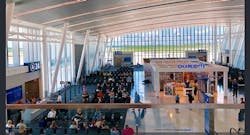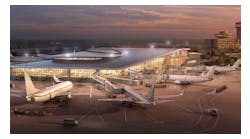On Feb. 10, Charlotte Douglas International Airport (CLT), and View announced the results of a study on the impact of natural light and the airport passenger experience. The study, conducted at CLT, found that natural light enhances passenger comfort, which in turn increases passenger satisfaction with gate experience.
View Smart Windows use artificial intelligence and machine learning to optimize the amount of natural light in the terminal while minimizing heat and glare, to provide a more comfortable environment for passengers. In addition, smart windows reduce energy consumption by reducing cooling requirements.
The study was conducted a year after CLT installed View Smart Windows in its Concourse A Expansion, which opened in July 2018 and houses United, Southwest, JetBlue, Air Canada, and Frontier Airlines.
Key findings from this study include:
- Passengers were 68 percent more likely to report being “very satisfied” with their overall experience in gates with View Smart Windows than in gates with traditional windows.
- The concourse with View Smart Windows had more natural light and less glare, and passengers rated it up to 33 percent more modern, efficient, bright and comfortable than the one with traditional windows.
- Seats at the gates with View Smart Windows are 15 degrees cooler than at gates with traditional windows, leading to a more comfortable passenger environment.
“We pride ourselves on providing an exceptional passenger experience, and this study shows that our new facilities are helping achieve that mission,” said CLT’s Acting Aviation Director Haley Gentry. “As airports increasingly look to instill confidence in the travel experience, it is clear that concourse design is key to ensuring satisfaction.”
The nine-gate concourse mimics the aerodynamic form of an airplane wing, with curved metallic ceilings and two-story views of the aircraft activity. Exposure to natural light and providing expansive views were key drivers of the design. The glass-walled corridor’s location – adjacent to the airport’s main entry drive – provides a sweeping visual connection to both landside and runway-side activities.
“Every airport is now investing in facilities that enhance the passenger experience. Most modern airport designs incorporate multi-story glass facades that bring more natural light and provide dramatic views; however, traditional glass also creates significant passenger discomfort through increased glare and heat,” said Rahul Bammi, chief business officer of View Inc. “View Smart Windows uniquely solve this problem and deliver on the design intent of creating delightful passenger experiences, while also reducing the airport’s carbon footprint. This study validates why airports are adopting View Smart Windows at an accelerating pace.”
View Smart Windows have been installed at several airports including: Boston Logan International Airport (BOS), Dallas Fort-Worth International Airport (DFW), San Francisco International Airport (SFO), New York LaGuardia Airport (LGA), Memphis International Airport (MEM), Phoenix Sky-Harbor International Airport (PHX) and Seattle-Tacoma International Airport (SEA).
Methodology
The study, led by Alan Hedge, professor emeritus in the Department of Design and Environmental Analysis at Cornell, was conducted in two concourses at CLT airport: Concourse A expansion that has View Smart Windows and Concourse E that has traditional Low-E windows. Phoenix Marketing International surveyed 575 passengers at gates on the south side of each concourse.



